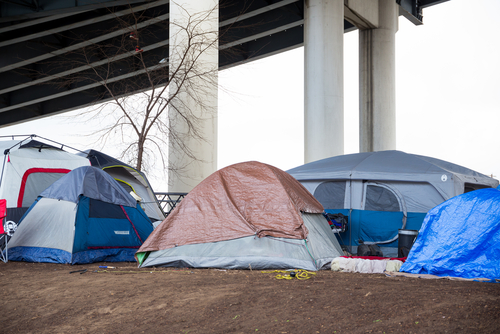Does banning camping by homeless people violate Eighth Amendment? Supreme Court agrees to decide

Homeless camps with tents and tarp shelter under a bridge in downtown Portland, Oregon, in February 2016. Photo from Shutterstock.
The U.S. Supreme Court on Friday agreed to decide whether the U.S. Constitution prevents the city of Grants Pass, Oregon, from issuing civil citations to people who violate a ban on sleeping on public property.
At issue is whether the city’s regulation of homeless encampments violates the Eighth Amendment ban on cruel and unusual punishment.
Publications with coverage include SCOTUSblog, the New York Times, Law.com and the Washington Post.
The Los Angeles Times published an op-ed on the case by Erwin Chemerinsky, dean of the University of California at Berkeley School of Law dean and an ABA Journal contributor. How Appealing links to additional coverage.
“The dispute brings together an unusual coalition of liberal and conservative leaders,” the New York Times reports. “Gov. Gavin Newsom of California, along with liberal-leaning cities like San Francisco, Los Angeles and Honolulu, has joined conservative Arizona legislators, right-leaning legal organizations and district attorneys offices in asking the court to take up the case” following an appeals court ruling for the homeless people challenging the camping regulations.
A Grants Pass, Oregon, ordinance bans people from sleeping on public sidewalks, streets or alleyways at any time, according to the cert petition. Another city ordinance bans camping on sidewalks, streets, alleys, parks or under bridges or viaducts and defines a campsite as any place where bedding or sleeping bags are used.
The 9th U.S. Circuit Court of Appeals at San Francisco ruled in September 2022 for the homeless plaintiffs, Gloria Johnson and John Logan. The appeals court held that the city violates the Eighth Amendment by enforcing its ordinances against homeless people for sleeping outside with protection from the elements when there was no other place to go.
The 9th Circuit relied on its 2018 decision Martin v. Boise, which held that the Eighth Amendment prohibits imposing criminal penalties against homeless people who sleep or sit outside because they can’t obtain shelter.
Both 9th Circuit cases cited Supreme Court precedent that said the government can’t punish people for being addicts because it is an involuntary status that they can’t change, according to Chemerinsky’s op-ed. The 9th Circuit said the sleeping and camping bans essentially punish the status of being homeless.
The cert petition says the Grants Pass, Oregon, case gave the 9th Circuit the opportunity to “correct course” following the Martin decision.
“Instead, it doubled down on Martin, extending that ruling to civil citations and affirming a classwide injunction against the city of Grants Pass” that prevents enforcement of the camping ban, the cert petition says. The en banc appeals court rejected a petition for rehearing in July in a 14-13 vote.
The case is City of Grants Pass v. Johnson.
The SCOTUSblog case page is here.
Write a letter to the editor, share a story tip or update, or report an error.



